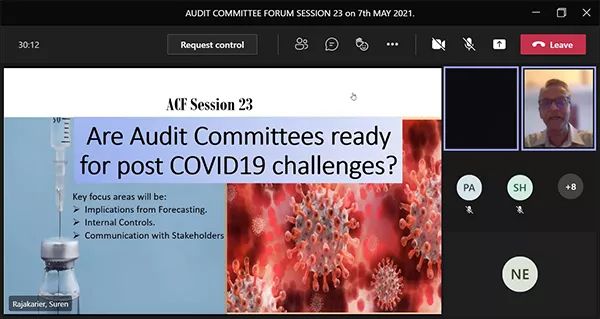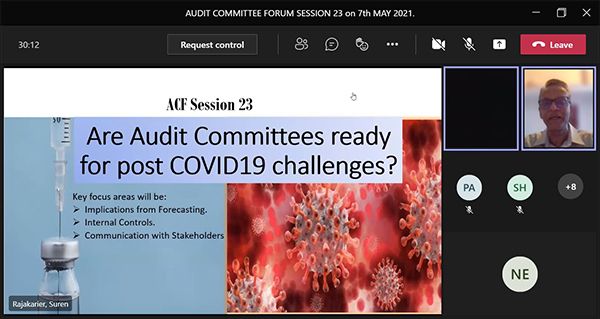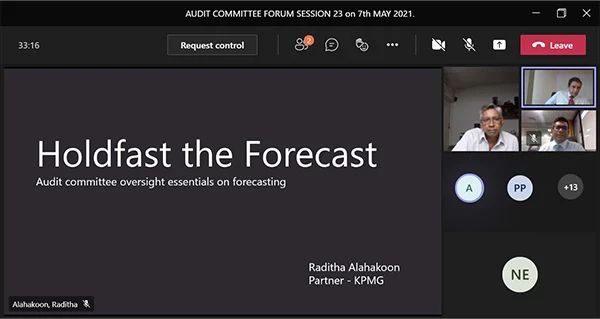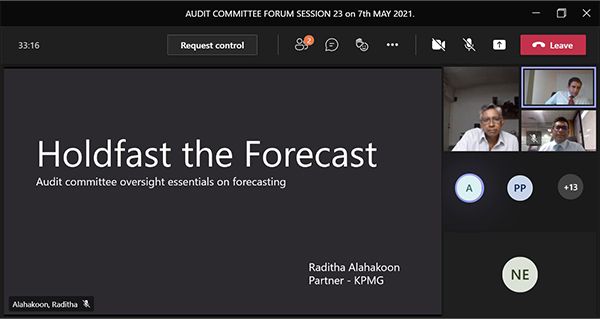KPMG Sri Lanka hosts 23rd Audit Committee Forum discussing the topic ‘Are Audit Committees ready for Post COVID 19 Challenges?’
KPMG’s 23rd Audit Committee Forum was held virtually on Ms Teams the 07th May 2021 to discuss the critical role Audit committees will play in helping companies to meet challenges that may arise Post pandemic. The session comprised of a presentation by Raditha Alahakoon (Partner – Department of Professional Practice (DPP), KPMG Sri Lanka) on the topic ‘Implications from Forecasting’, followed by a panel discussion with Alastair Corera (Chairman – Citizens Development Business Finance PLC), Dilshan Perera (Group Finance Director – Laugfs Group), Anushya Coomaraswamy (Former Finance Director – John Keells Holdings PLC, Independent Non-executive director – Printcare PLC) and Nilam Jayasinghe (Group Director – Finance of Ceylon Biscuits Limited (CBL) Group of Companies) moderated by Suren Rajakarier (Partner – Head of Audit, KPMG Sri Lanka).


Moderator - Suren Rajakarier (Partner – Head of Audit, KPMG Sri Lanka) introducing the session
Implications from Forecasting
In his presentation Raditha mentioned that in the face of the current challenges, Audit Committees should ensure that forecasts are entity-specific and are an unbiased estimation of the future, by identifying and eliminating any management bias in the forecasting process. In doing so, Audit Committees should seek clarity by asking direct and targeted questions from the management on the following areas:
- Data, systems and people: Pay attention to the processes in place for forecasting, the validity of the data used, the management review controls over forecasting and the capability of the employees engaged in forecasting.
- Methods and key assumptions: Question appropriateness of accounting estimates, alternatives and multiple scenarios assessed, and consideration of high-impact, low probability events.
- Estimation uncertainty: Consider the assessment and mitigation of forecasting uncertainty and adequacy of stress testing and sensitivity analysis. Retrospective analysis of actual performance vs what was projected and understanding the reasons for deviations can improve the quality of forecasts.
- Disclosures in financial statements: Accuracy and adequacy of disclosures and how they compare with peers
Further he went on to say that Audit Committees should ensure that the forecasting process has the flexibility to generate projections under multiple scenarios and drill down to granular level.
Adding on this topic, Alastair and Dilshan presented their views on the practicalities of forecasting in challenging times. Alastair highlighted the importance of conducting a scenario analysis as a standard practice, using a wider data set rather than the most immediate past and being aware of the inbuilt ‘recency’ bias which gives greater importance to recent events. Dilshan also highlighted the importance of the audit committee obtaining the relevant data and assumptions from the management, which will in turn allow them to raise the correct questions.


Raditha Alahakoon (Partner – Department of Professional Practice (DPP), KPMG in Sri Lanka) making a presentation on the topic ‘Implications from Forecasting’
Internal Controls
Anushya began the discussion on post COVID19 opportunities available to Audit Committees to improve the entity’s control environment by focusing on the implications on physical inventory management. She highlighted the importance of documenting a clear process which ensures segregation of duties, physical controls and effective handing-over of duties. She also stressed the importance of robust IT systems and definitive IT controls. Nilam suggested more frequent audits and reporting to the Audit Committee in order to address these risks, while Dilshan emphasized the need for cyclical inventory checks (perpetual counts) and use of digital tools for virtual monitoring.
Communication with stakeholders
The final topic of the session covered the appropriateness of disclosure of accounting treatment and financial reporting presentation for unusual transactions related to COVID-19. Raditha mentioned that increased disclosures are recommended on the assumptions made relating to impairment and valuations. He also suggested increased focus on credit risk management disclosures such as debtor management and exposure to liquidity risk. Adding to this, Alastair said that investors would like to see companies disclosing more information on market comparisons, although this is a challenge due to management’s view that such disclosures would give competitors an unfair advantage.
As the forum drew to a close, Suren highlighted the Audit Committee’s role in understanding the requirements of SLFRS’s and business implications of forecasting on accounting judgments—such as potential impairments, recovery of deferred tax assets and going concern considerations which are driven by forecasts. He added that Audit committees should ask relevant questions from management to ensure integrity of financial reporting.
KPMG Sri Lanka in collaboration with Sri Lanka Institute of Directors (SLID) facilitates the Audit Committee forum which seeks to bring together Audit Committee Members to discuss key issues and challenges that face them and guide them in steps they could take to become more effective in their roles.